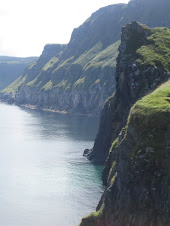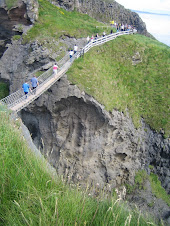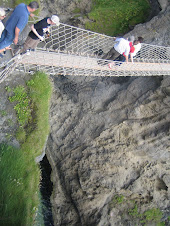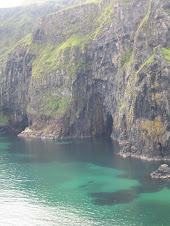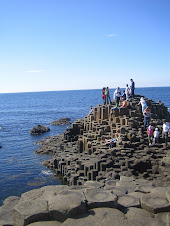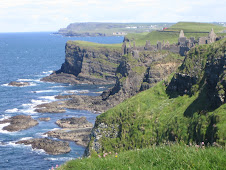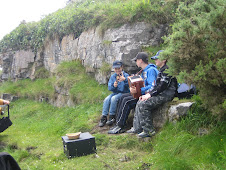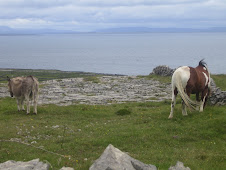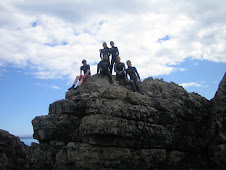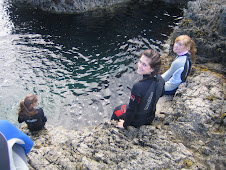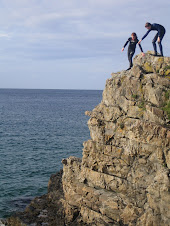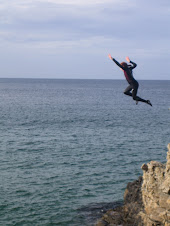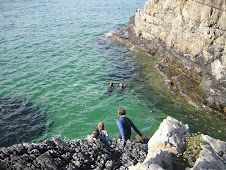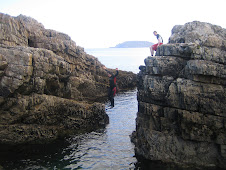
(integrated in that it encompasses both Protestant and Catholic children; college is equivalent to our middle school and high school students), he gave me the contact information of another primary school that also advocates peace resolutions for children, but I've been pretty consumed with work at Hazelwood and haven't had time to go over there. I was picked up by a woman with whom I've been working closely in Hazelwood's Alternative program (which functions in a framework concerning community service, social justice, peace & conflict studies, and so forth) and introduced to her wonderful family in Belfast. I was able to speak with her oldest daughter, age 17, briefly about the conflict, but she didn't seem to be too well-engrossed in it. Her family has ties to the Northern Ireland government, but the impression that I received from her was that the youth community suffers more from the post-conflict effects rather than from the Protestant-Catholic conflict itself. I also perceived that the terms "Protestant" and "Catholic" in Northern Ireland are truly more than mere religious groups. They naturally encompass the religious aspect and literal meanings of the religions themselves, but they also encompass cultural, political, and social implications. In fact, it seems that the Northern Irish (particularly the students and children) may claim to be one or the other but don't truly understand the totality of the religion; it's simply engrained into their minds at a young age that they are part of one particular group. I tried constructing an analogy to the racism problem in the states concerning color, nationality, and culture, but in actuality, the social conflict in Northern Ireland appears to be even more complex in that it involves such additional variables that wouldn't be intrinsically or necessarily factored into American conflict. Aside from this primary factor, moreover, now that the conflict has somewhat subsided and is much less apparent than it was even ten years ago, it is perhaps more problematic yet again in that there is an attempt to transform Belfast into a replication of the southern, cosmopolitan capital city of the Republic of Ireland, with its newly-emerging vivacious nightlife, tourist industry, booming business community, ecletic restaurants with influences from around the world, and so on and so forth. From a brief glance, this would certainly be the immediate resolution to elevate Belfast into a "community"; and yet not everyone here is quite ready to move to that next level. There are still numerous problems engrained into this society that have been overlooked and perhaps unconsciously swept under the rug. A third factor to consider is Northern Ireland and the rest of the United Kingdom's recent admission to the European Economic Union. As a result, many families from eastern Europe and Asia have immigrated into the Northern Ireland community, adding a racism variable to the social conflict here that is quite similar to what we experience in the states. There is a significant amount of tension within the adult community, including abrupt and blatant expressions of contempt, for the newly-immigrated ethnic minorities. Moreover, I noticed during my first week of observing classes at Hazelwood that, for instance, a Chinese boy was socially and academically isolated from the rest of his peers in an art class, and two Polish boys were ostracized and often discretely questioned/opposed by their classmates. It seems that such issues as diversity and multicultural awareness that are so heavily emphasized in American schools are new and unfamiliar to Northern Ireland schools, and this shows in the social interactions of their students. I spoke more about education in Northern Ireland with one of the other teachers with whom I've been working closely; she explained to me that the school tends to have a lot of students of lower socioeconomic status, as it is considered an "inner-city school" and thus their parents are more likely to have been occupied by the Protestant-Catholic conflict and the fighting/quarreling that necessarily accompanies it. As a result of this replication of values within the children, the kids tend to not be as focused in school since their parents don't emphasize such a lifestyle and they lack the confidence and drive necessary to succeed at the higher levels. The children with whom I've been working who are involved with the Alternative program tend to be, though are not necessarily, less academically-inclined and perhaps of more troubled family backgrounds. I'll get into a bit more detail as to the specifications of my various projects in a few moments.
Interestingly enough, the location of Hazelwood Integrated College is in North Belfast. I was informed that North Belfast is where many people died during the Troubles: it has interface communities that are close in proximity to one another. The North is therefore considered to be "mixed". West Belfast is predominantly Catholic; East Belfast is predominantly Protestant. South Belfast, where my flat is located right near the River Lagan and Queen's University, is the upper-class area where the better schools are located as well as the university students.
City Centre:

North Belfast:
West Belfast (Gaelic Football Match Co Antrim vs. Co Derry):
It is also significant to note that Northern Ireland used to be much more affluent than the Republic of Ireland; they used to joke that the streets in the south were merely dirt roads with no signs or construction. Now, however, the tables have turned and it is in fact the Republic of Ireland that currently has a booming economy and society. From my perceptions and what I've been told, those still involved with the conflict are fighting for something that nobody wants. The Loyalists (Democratic Unionist Party, Ulster Unionist Party, Progressive Unionist Party, etc.) want Northern Ireland to remain part of the United Kingdom, but it appears that Britain is really far removed from the conflict in N. Ireland; the Nationalists (Sinn Féin, Social Democratic and Labour Party, etc.) want Northern Ireland to join with the Republic of Ireland and become one nation, but from my experiences in Dublin, the Republic is fed up with the conflict in the North and has become rather indifferent to its Northern counterpart's fate. Then, there are political parties such as the Green Party and the Alliance Party that wish to remove sectarianism from politics and work within both communities to contribute to the future state of Northern Ireland. I was fortunate enough to join a group from Northeastern University on a tour of the Parliament building in Belfast; the Northern Ireland government does not have unlimited and total control. As part of the Agreement, power must be shared between the Nationalists and the Unionists; but this power merely entails such matters as health, education, the environment, agriculture, transport, road safety, sports, and housing. The British Parliament maintains power over international relations, defense, income taxes, space exploration, and nuclear power. Belfast prisons just recently received handcuffs and other implementations of control. We were able to engage in conversations with leaders and speakers from the various political parties, and all agreed that Democratic Unionist speaker was very elusive and inarticulate. His arguments were not well-supported or explained, perhaps because he realized such a political party would not be well-received or understood by a group of Americans. However, it is very difficult to maintain an opinion of another country's politics when one has not experienced the height of its troubles or lived through such experiences as an actual citizen of that country.
Aside from helping out with odds and ends at the "Bungalow" (where the Alternative Program is held), I was involved in Speak Your Peace at Hazelwood where the children discussed differences in a safe environment. The day was created in light of the death of a Protestant Hazelwood student several years ago during the height of the Troubles. Allegedly, the student had been throwing rocks at a Catholic woman's car, and he was somehow run over by the car while on his bike. In alleged retaliation, a Catholic man received a phone call to leave work early because his girlfriend was in trouble; upon stepping outside of his work building, he was gunned to death. The Speak Your Peace day reflects upon the presence of the Troubles within Hazelwood's own community of Belfast. I co-led one group in which the children were engaged in various activities, such as discussing international stereotypes and Northern Ireland stereotypes and bringing in symbols that were significant to them as individuals and contributed to their self-perceptions and identities. This aroused a bit of trouble in that two Catholic boys used the tri-color (traditional Irish) flag as their symbol, and another Protestant girl displayed the Union (British) flag as her symbol. The boys were rude when the girl presented her symbol, which can be adequately explained; however, I was astounded when they were also rude towards another girl displayed a cross and described it as neither Catholic nor Protestant but simply a "Christian" symbol, stating that God was important to her. This indicates that the kids don't really know why they're Catholic or Protestant, but this type of behavior is just so heavily incorporated into their daily lives that they wouldn't even recognize their own hypocrisy. They also played a game called "Not in My House" in which they were given descriptions of various fictitious characters, such as a gay nurse, a member of the Orange Order, a Sinn Féin member, and so on and so forth, and they had to work as a team to hierarchically order which individual they would more likely allow to rent out their house if they themselves were the landlord. The kids were actually pretty conscious of sectarianism and thus both groups tied the Orange Order member and the Sinn Féin member; after the first round, they were given additional information that showed that the more "innocent" individuals, such as the schoolteacher, had flawed backgrounds (the schoolteacher had a history of sexual abuse with children) and the "less desirable" individuals, such as the member of the Orange Order, were actually decent individuals who each had a story and a reason for their contemporary lifestyles. It taught the children to not be so judgmental of others and to truly get to know people for who they are as individuals rather than generalizing them by their group's stereotypes.





I also organized another game for the younger children on communication and teamwork within groups of different kinds of people called "The Beast" in which the students were allocated various roles within an assemblyline type group and had to work together to replicate the original Beast that I created out of styrofoam balls, pipe cleaners, feathers, cottonballs, and so forth.




This week, I am being trained in a group called PIPS (prevention against suicide) that directly deals with the high suicide rate of Catholic youths in North Belfast. They seem to think it is another post-conflict effect; now that they are no longer required to fight in Sinn Féin's "army" and did not quite have the urgency or desire to attend university, many of the poorer Catholic youths feel idle and useless after they complete the required education of up to 16 years of age. Thus, some of them have resorted to suicide, including the son of the man who generated this program to combat such suicide. In light of this boredom with Northern Ireland and in addition to the lack of multicultural awareness in Belfast, I started a weekly "Crossing the Atlantic" lunch group where we discuss the differences between America and Northern Ireland, our various perspectives and stereotypes of one another, what the children love about Northern Ireland (which is difficult because they all seem to think that America is significantly better, to which I responded that America has conflict and problems as well, and that the average child's life is in actuality not exactly like the kids' lives on the MTV "reality" show "My Super Sweet 16"), and what they can do as individual human beings to contribute to the growing and future peaceful state of Northern Ireland. After listening to the speakers of the Green and Alliance Parties, I truly believe that the children of Northern Ireland are the foundation of a new Northern Ireland, not the perception of it that many of us continue to have as a war zone. In reality, they're just kids, and they just want to have normal lives and live in a normal environment. I'm also helping out with a Multicultural program to raise awareness of ethnic minorities in Belfast. Hopefully, these various activities that I've created or partaken in will make a difference in at least one of their lives and thereafter inspire them to proactively reform Belfast into a new Belfast.

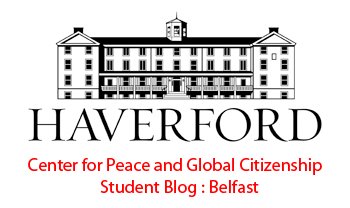


















































































.jpg)

